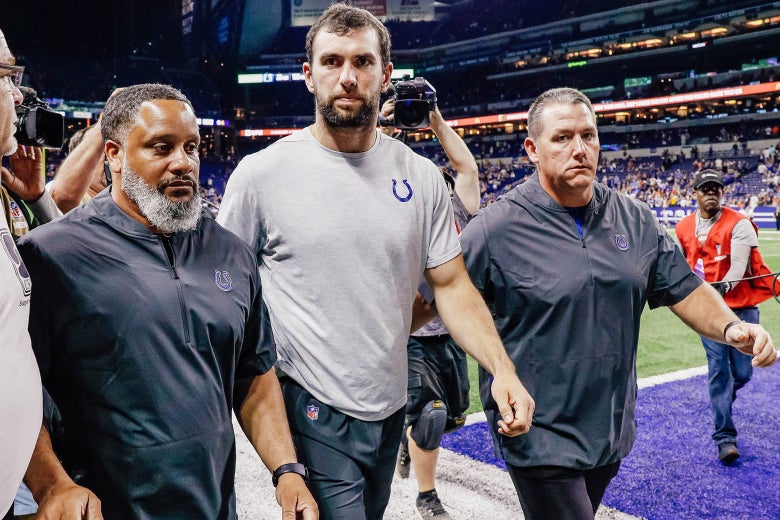By: Zachary Draves .
Indianapolis Colts quarterback Andrew Luck announced that at age of 30, he was retiring from football and leaving $500 million on the table.
His announcement came with shock by some, but with understanding by others.
Andrew’s reasoning was that he was “mentally worn down” by all of the pressures and stressors that come with playing at the highest level.
Given that while during his career, he played through tremendous pain and endured crippling injuries while being second in passing for touchdowns and third in most yards in his first six seasons in the league, his decision is not without justification.
He admitted to the public that his choice was extremely difficult.
But if we just take a look at the circumstances surrounding his announcement, the details of the series of injuries he suffered are sickening to bear.
He experienced a torn abdomen, continuous ankle/calf issues, torn cartilage in his ribs, a concussion, a torn labrum in his throwing shoulder, and even a lacerated kidney that caused him to urinate blood.
All of this before the age of 30.
His first public appearance came this past Sunday in Indianapolis where the Colts were playing a preseason came against the Chicago Bears.
Some fans booed and jeered as he walked off the field. Some took to social media to mock him.
They called him “soft” or that he “pussied out”.
Sports pundit Doug Gottlieb tweeted “Retiring cause Rehabbing is too hard is the most millennial thing to do #AndrewLuck”.
The problem with this kind of rhetoric is that they are essentially questioning Andrew’s manhood.
This speaks to a larger societal issue about how we construct masculinity, in other words, what does it mean to be a man?
Historically, men have been taught since childhood to be “tough”, “strong”, “aggressive”, “and dominant”. They are told to not show emotion, vulnerability, fear, or sadness.
The NFL in particular has played a huge part in extending this definition of hypermasculinity forever. They value toughness, aggression, dominance, playing through pain, and metaphors related to militarism (“bomb”, “blitz”, “in the trenches”)
It shouldn’t be a surprise that the NFL would be the most popular sport in a country that tends to promote a hypermasculine culture.
Unfortunately, these ethos can be looked at as having contributed to the scourge of former players who have lived with CTE and other physical and mental injuries that have had a vicious impact on their well-being.
It can also be seen as having contributed to plague of violent behavior towards women and girls which the NFL has shamefully turned a blind eye.
It can also play itself out in the attitudes of those who reacted to Andrew Luck’s retirement.
Overall, this toxic definition of masculinity has cost the well-being and in many cases the lives of dozens of men and boys whether imposed on themselves or on others.
It can be argued that deep in his psyche, Andrew didn’t want to be another statistic.
He simply wanted to live the rest of his life safe and healthy.
He was willing to give up half a billion dollars so that he can prioritize himself and his family.
If that is not tough and courageous, I don’t know what is.


 NFL
NFL





